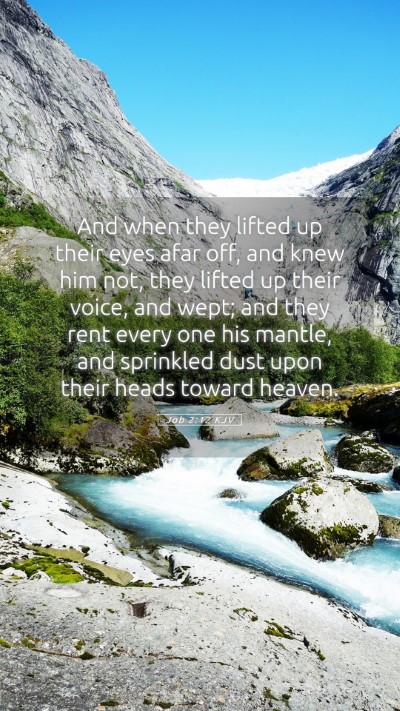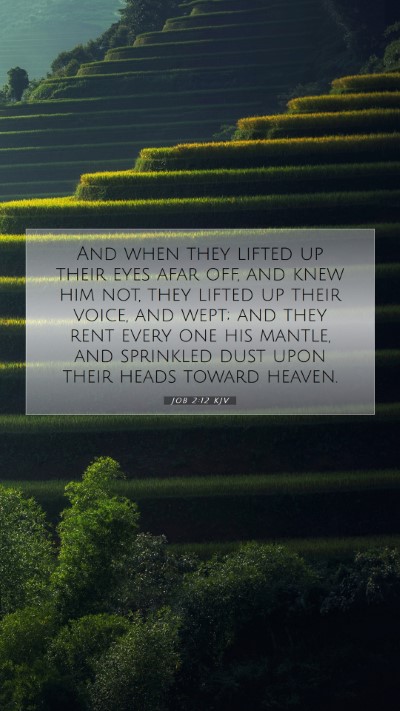Old Testament
Genesis Exodus Leviticus Numbers Deuteronomy Joshua Judges Ruth 1 Samuel 2 Samuel 1 Kings 2 Kings 1 Chronicles 2 Chronicles Ezra Nehemiah Esther Job Psalms Proverbs Ecclesiastes Song of Solomon Isaiah Jeremiah Lamentations Ezekiel Daniel Hosea Joel Amos Obadiah Jonah Micah Nahum Habakkuk Zephaniah Haggai Zechariah MalachiJob 2:12 Meaning
What is the meaning of Job 2:12?
And when they lifted up their eyes afar off, and knew him not, they lifted up their voice, and wept; and they rent every one his mantle, and sprinkled dust upon their heads toward heaven.
Job 2:12 Bible Verse Meaning
Understanding Job 2:12
Job 2:12 states, "And when they lifted up their eyes afar off, and knew him not, they lifted up their voice and wept; and they rent every one his mantle, and sprinkled dust upon their heads toward heaven." This verse describes the profound grief and mourning experienced by Job's friends upon seeing his suffering. They recognized Job, but his changed appearance was so drastic that they did not immediately identify him.
Bible Verse Meanings: Insight from Commentaries
Various public domain commentaries provide rich interpretations of this verse, enhancing our understanding of both the text and its significance.
Matthew Henry's Commentary
According to Matthew Henry, this passage illustrates the depth of sorrow that Job's friends felt upon seeing his affliction. Their act of tearing their garments and sprinkling dust on their heads is a traditional sign of mourning in the ancient Near Eastern culture, symbolizing their empathy towards Job's tragic condition. This demonstration of grief also reflects their recognition of the severity of Job's plight, reinforcing the idea that true friendship is marked by shared sorrow.
Albert Barnes' Notes
Albert Barnes notes the significance of the phrase "knew him not." The transformation of Job's health and appearance due to his catastrophic losses was so great that it obscured his identity to his friends. This sorrowful moment is poignant and showcases the extremity of Job's suffering. Barnes also emphasizes the communal aspect of mourning, where Job's friends come together to support him in his time of need; their physical expressions of grief demonstrate the strong bond of friendship during trials.
Adam Clarke's Commentary
Adam Clarke expounds upon the cultural practices of mourning described within this verse. He marvels at the depth of Job's affliction, noting that the act of sprinkling dust upon their heads symbolizes humility and grief before God. Clarke points out that such mourning serves not only as a tribute to Job's suffering but also as a reminder of the fragility of human life. The physical manifestation of grief seen within the text presents an opportunity for readers to reflect on their responses to the suffering of others.
In-Depth Analysis and Commentary
Understanding Job 2:12 requires attention to the historical context in which it was written, alongside an appreciation for the emotional landscape depicted in the verse.
- Cultural Context: Job's friends adhered to the ancient practices of mourning which included tearing their clothing and placing dust on their heads. This was a customary response to demonstrate solidarity and compassion.
- Emotional Response: The weeping and visible signs of mourning underline the significant emotional toll that Job’s suffering had on those around him. It reflects the relational dynamics of human suffering, wherein the pain of one person affects others.
Application to Daily Life
Job 2:12 provides valuable lessons on empathy and support in times of suffering. Christians today might draw upon this verse to understand the importance of being present for those who are grieving or struggling. The act of mourning together fosters community and is a powerful reminder of our shared humanity.
Related Bible Verses
- Romans 12:15 – "Rejoice with those who rejoice, and weep with those who weep."
- Ecclesiastes 3:1-4 – "To everything there is a season, and a time to every purpose under heaven..."
- Psalms 34:18 – "The Lord is nigh unto them that are of a broken heart..."
Conclusion
Job 2:12 invites reflection on the nature of suffering, friendship, and the imperative to engage with those who face hardships. When seeking to understand Scripture, this verse demonstrates how mourning is an integral part of community support. Biblical exegesis and careful study of passages like Job 2:12 not only clarify meanings but also enrich our ability to apply these teachings in contemporary contexts.


